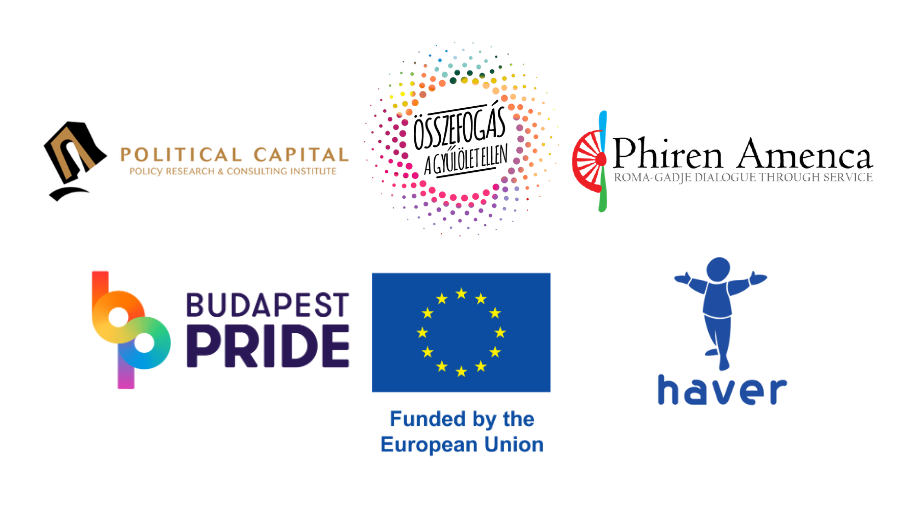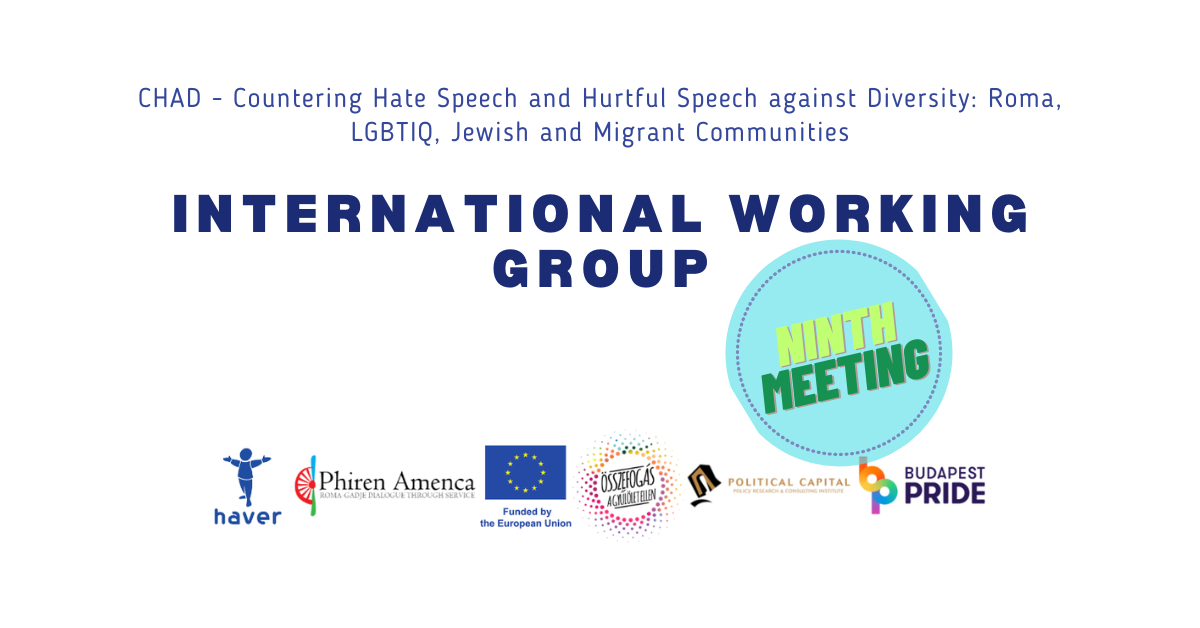February 13, 2024 – Online
The international working group, formed in the frame of the CHAD project, had its ninth meeting on 13 February 2024. The topic was hate speech and education, focusing on how educators can recognise and combat hate speech in their classrooms.
Three presentations took place at the meeting. The first presentation on how future teachers can confront extremism and hate speech was held by Jordi Castellví Mata, lecturer and member of GREDICS Research Group based at the Autonomous University of Barcelona (Universitat AutònomaAutonoma de Barcelona). The second presenter, Vilja Arató, Program Coordinator of Power of Humanity Foundation (Emberség Erejével Alapítvány), based in Pécs (Hungary), introduced the E-Star e-learning project (E-learning for Standing Together Against Racism) for teachers confronting invisible racism. The third presenter, Sabrina Vorbau, Project Manager at European Schoolnet and its Digital Citizenship Team, showcased the SELMA project (Social and Emotional Learning for Mutual Awareness), an educational project to tackle online hate speech designed for 11-16-year-old students.
Summary of the presentations
Future teachers confronting extremism and hate speech
GREDICS Research Group on Social Science Education is interested in topics like hate speech at schools, democracy education, futures of education, gender education, global citizenship, hegemonic discourses, counternarratives, the relationship between populism and education, and social science education in general.
The research project „Can future teachers spot and confront extremism and hate speech?” was funded by the Spanish Ministry of Science and Innovation, and the principal investigator was Antoni Santisteban. The project was conducted at several Spanish universities, and it was not only focused on hate speech but also on global citizenship, gender, and futures education. The study presented at the meeting was conducted by a subgroup of the research group, focusing on hate speech and critical thinking. Participants were recruited from two Spanish universities (University of Malaga and Autonomous University of Barcelona) and the final sample (N=114) contained 2nd and 3rd year students studying to become teachers. During the presentation, it was mentioned one limitation of the study is that a follow-up is not possible because of anonymity.
In the first stage of the study, participants were presented with a citation which contained anti-Muslim statements, and they were asked if they interpreted it as hate speech. 90% of them interpreted the citation as hate speech and 10% doubted it or reproduced it. During the presentation, it was mentioned that in previous experiments, where students were shown fascist statements, some of them could not distinguish between hate speech and freedom of speech or defence of one’s position.
The second stage of the study aimed to investigate if future teachers can point out why a statement is considered hate speech. Most students gave explanations on why they identified a statement as hate speech in line with the results of previous studies (e.g. othering and generalising are features of hate speech). According to the researchers, it is important to examine whether future teachers will be able to spot hate speech in their classes. As this would be even more complicated in a real educational environment, this ability cannot be fully concluded from a study.
In the third stage, the researchers asked future teachers what they would do to confront hate speech in their classrooms. According to the results, a few students would point out its negative impact on society (2.63%) or the incoherence of discourse (10.53%). Most of the students (43.86%) would dismantle hate speech by pointing out the inexact argumentation of the author, and 17.54% would offer an alternative narrative to students. However, 25.44% of future teachers claimed they had no tools for confronting hate speech.
In the final part of the presentation, it was introduced practices that can be used to confront hate speech in classrooms. The students using hate speech are not more ignorant or less educated than others, therefore they should not be treated that way. The presenter emphasised the importance of speaking about controversial issues at school because omitting these can reinforce populism and the teachers should create a safe environment where students can express their attitudes, and the teachers should encourage political dialogue, and dismantle hate speech by argumentation.
Introduction to the E-STAR project
The Power of Humanity Foundation is based in Pécs and was founded in 2006. It aims to create a liveable society for all and stand up for human rights and democracy. The foundation has two main programmes: one for supporting regional NGOs, and one for human rights education which aims to bring human rights education into schools and show students how they are affected by it, what they can do and that it works. The Foundation is developing curriculum-based lesson plans, holding courses at universities, organising teacher and youth worker training, living library, and workshops for school groups, and they are also involved in online and offline game development. The process of game development goes through five stages: (1) they find an issue they want to deal with, (2) they build a story around it (because it makes it easier to understand it), (3) they build characters students can identify with, because it protects students’ own identity from eventual negative effects, (4) they bring in playful elements that make the game more enjoyable (but not at the cost of the message they want to transfer) and (5) they make sure students can follow up the topic (e.g. by providing links, starting conversations about it).
The Foundation in cooperation with Cazalla Intercultural (Spain), Replay Network (Italy), Terram Pacis (Norway) and Erasmus+ Youth, started the E-STAR project which aims to provide tools for teachers to work on the topic of invisible racism in their classroom. The project lasted three years (2017-2020) and had three main outputs: an online game, a handbook, and an e-learning course.
The online game, called Day by Day, is a role game for confronting invisible racism which is available in both English and Hungarian. The story of the game is that the main character falls in love with a Roma person and they face obstacles and atrocities based on their partner’s race. The game involves exercises for students to recognize stereotypes, hate speech, genocide, and the linear connection between them. The self-paced e-learning course lasts five weeks and has six chapters. After the first introduction chapter, there is one about understanding racism, one about creating safe space environments, one about internalised racism, one about the bystander role and the last one about empowering young people, and it provides them with practical tips. The book is a collection of activities to be done in classrooms and youth clubs to challenge invisible racism, combined with some theory. It aims to provide teachers and future teachers with tools against invisible racism.
Vilja Arató mentioned that they are now working on shorter games in collaboration with other organisations: with Civil College Foundation on an online game about election fraud, with City is for All on another game about the public toilet situation in Pécs, and with Amnesty International and Association of Hungarian Women in Science on an online game for high schoolers about gender equality and it also has a board game version for kindergartners.
Introduction to the SELMA project
Sabrina Vorbau presented the SELMA (Social and Emotional Learning for Mutual Awareness) project, an educational project designed for 11-16-year-olds to tackle online hate speech. It was running from 2017 to 2019, under the European Union’s Rights, Equality and Citizenship founding framework. It was focused on three areas: social and emotional learning, media literacy and citizenship education.
Hate speech is an increasing problem in society, therefore they wished to provide a proactive approach for young people and educators to create places that allow critical thinking, thoughtful reflection, and an active dialogue. The project was led by a consortium of six organisations (specialising in education, online counselling, online safety, youth health and anti-bullying youth programmes) in Denmark, Germany, Greece and the UK, with European Schoolnet as project coordinator.
The project had three main outcomes: (1) a research report of qualitative and quantitative research conducted in the first year of the project, (2) activities for young people, e.g. Hackathon to come up with innovative solutions to tackle online hate speech, (3) an educational toolkit for a range of professionals. Besides the main outputs, they established an education task force to facilitate cooperation between policymakers, governments, and industry. A final conference was organised, and in the partner countries training for school staff, parents and young people about how to use the toolkit was provided. In the framework of the project, a MOOC (Massive Open Online Conference) for interested teachers from all European countries was organised and a book containing the best practices and ideas of the projects was published. They intended to reach young people in platforms and formats they are familiar with. She also said that the toolkit has already been successfully applied in partner countries, and they already got positive feedback about its effect, but unfortunately, since the project ended, they have not been able to follow up on its further effects.
The SELMA toolkit was developed based on a model which targets the social and emotional learning, media literacy and citizenship areas on self, peers, and society levels. The toolkit is mainly for educators to improve students’ skills in these areas. The SELMA toolkit can be used tailored to users’ current knowledge and interest, there are suggested pathways for completing the material, but it is flexible. The material is organised around nine key themes (e.g. „What is hate speech?”), and each theme has a series of focus areas like peer mentoring, emotional learning, media production, media analysis and citizenship. Based on the number of downloads between 2018 and 2019, the first two themes „What is hate speech?” and „Why is there hate speech content out there?” were the most popular ones. Once users have selected the theme and focus, they will be directed to activities, and they also get additional supporting elements in the topic (e.g. warm-up activities, and potential questions). They also provide users with guidance material (e.g. how to apply the toolkit at schools or with vulnerable groups). The toolkit can also be used by parents and carers, out of formal education context. Although the home environment is not as controlled as the school environment, it may not be a problem. SELMA toolkit has translated and localised versions for all four partner countries (English, Danish, German and Greek). In addition, since the project end the SELMA toolkit has been translated and rolled-out in Finnish, Polish and Portuguese.



